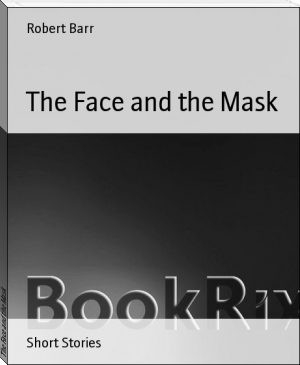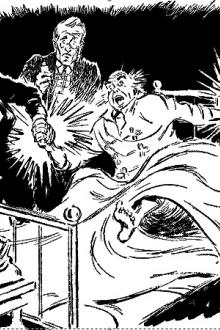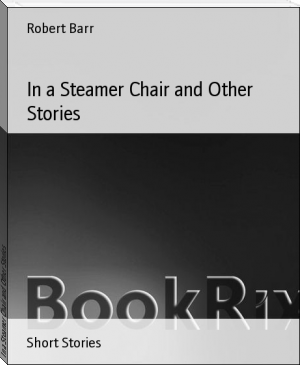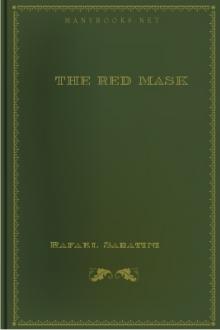The Face and the Mask - Robert Barr (comprehension books TXT) 📗

- Author: Robert Barr
Book online «The Face and the Mask - Robert Barr (comprehension books TXT) 📗». Author Robert Barr
had a seven days' fog, and sometimes a seven days' calm, but these two conditions never coincided until the last year of the last century. The coincidence, as everyone knows, meant death--death so wholesale that no war the earth has ever seen left such slaughter behind it. To understand the situation, one has only to imagine the fog as taking the place of the ashes at Pompeii, and the coal-smoke as being the lava that covered it. The result to the inhabitants in both cases was exactly the same.
IV.--THE AMERICAN WHO WANTED TO SELL.
I was at the time confidential clerk to the house of Fulton, Brixton & Co., a firm in Cannon Street, dealing largely in chemicals and chemical apparatus. Fulton I never knew; he died long before my time. Sir John Brixton was my chief, knighted, I believe, for services to his party, or because he was an official in the City during some royal progress through it; I have forgotten which. My small room was next to his large one, and my chief duty was to see that no one had an interview with Sir John unless he was an important man or had important business. Sir John was a difficult man to see, and a difficult man to deal with when he was seen. He had little respect for most men's feelings, and none at all for mine. If I allowed a man to enter his room who should have been dealt with by one of the minor members of the company, Sir John made no effort to conceal his opinion of me. One day, in the autumn of the last year of the century, an American was shown into my room. Nothing would do but he must have an interview with Sir John Brixton. I told him that it was impossible, as Sir John was extremely busy, but that if he explained his business to me I would lay it before Sir John at the first favorable opportunity. The American demurred at this, but finally accepted the inevitable. He was the inventor, he said, of a machine that would revolutionize life in London, and he wanted Fulton, Brixton & Co. to become agents for it. The machine, which he had in a small handbag with him, was of white metal, and it was so constructed that by turning an index it gave out greater or less volumes of oxygen gas. The gas, I understood, was stored in the interior in liquid form under great pressure, and would last, if I remember rightly, for six months without recharging. There was also a rubber tube with a mouthpiece attached to it, and the American said that if a man took a few whiffs a day, he would experience beneficial results. Now, I knew there was not the slightest use in showing the machine to Sir John, because we dealt in old-established British apparatus, and never in any of the new- fangled Yankee contraptions. Besides, Sir John had a prejudice against Americans, and I felt sure this man would exasperate him, as he was a most cadaverous specimen of the race, with high nasal tones, and a most deplorable pronunciation, much given to phrases savoring of slang; and he exhibited also a certain nervous familiarity of demeanor towards people to whom he was all but a complete stranger. It was impossible for me to allow such a man to enter the presence of Sir John Brixton, and when he returned some days later I explained to him, I hope with courtesy, that the head of the house regretted very much his inability to consider his proposal regarding the machine. The ardor of the American seemed in no way dampened by this rebuff. He said I could not have explained the possibilities of the apparatus properly to Sir John; he characterized it as a great invention, and said it meant a fortune to whoever obtained the agency for it. He hinted that other noted London houses were anxious to secure it, but for some reason not stated he preferred to deal with us. He left some printed pamphlets referring to the invention, and said he would call again.
V.--THE AMERICAN SEES SIR JOHN.
Many a time I have since thought of that persistent American, and wondered whether he left London before the disaster, or was one of the unidentified thousands who were buried in unmarked graves. Little did Sir John think when he expelled him with some asperity from his presence, that he was turning away an offer of life, and that the heated words he used were, in reality, a sentence of death upon himself. For my own part, I regret that I lost my temper, and told the American his business methods did not commend themselves to me. Perhaps he did not feel the sting of this; indeed, I feel certain he did not, for, unknowingly, he saved my life. Be that as it may, he showed no resentment, but immediately asked me out to drink with him, an offer I was compelled to refuse. But I am getting ahead of my story. Indeed, being unaccustomed to writing, it is difficult for me to set down events in their proper sequence. The American called upon me several times after I told him our house could not deal with him. He got into the habit of dropping in upon me unannounced, which I did not at all like, but I gave no instructions regarding his intrusions, because I had no idea of the extremes to which he was evidently prepared to go. One day, as he sat near my desk reading a paper, I was temporarily called from the room. When I returned I thought he had gone, taking his machine with him, but a moment later I was shocked to hear his high nasal tones in Sir John's room alternating with the deep notes of my chief's voice, which apparently exercised no such dread upon the American as upon those who were more accustomed to them. I at once entered the room, and was about to explain to Sir John that the American was there through no connivance of mine, when my chief asked me to be silent, and, turning to his visitor, gruffly requested him to proceed with his interesting narration. The inventor needed no second invitation, but went on with his glib talk, while Sir John's frown grew deeper, and his face became redder under his fringe of white hair. When the American had finished, Sir John roughly bade him begone, and take his accursed machine with him. He said it was an insult for a person with one foot in the grave to bring a so-called health invention to a robust man who never had a day's illness, I do not know why he listened so long to the American, when he had made up his mind from the first not to deal with him, unless it was to punish me for inadvertently allowing the stranger to enter. The interview distressed me exceedingly, as I stood there helpless, knowing Sir John was becoming more and more angry with every word the foreigner uttered, but, at last, I succeeded in drawing the inventor and his work into my own room and closing the door. I sincerely hoped I would never see the American again, and my wish was gratified. He insisted on setting his machine going, and placing it on a shelf in my room. He asked me to slip it into Sir John's room come foggy day and note the effect. The man said he would call again, but he never did.
VI.--HOW THE SMOKE HELD DOWN THE FOG.
It was on a Friday that the fog came down upon us. The weather was very fine up to the middle of November that autumn. The fog did not seem to have anything unusual about it. I have seen many worse fogs than that appeared to be. As day followed day, however, the atmosphere became denser and darker, caused, I suppose, by the increasing volume of coal- smoke poured out upon it. The peculiarity about those seven days was the intense stillness of the air. We were, although we did not know it, under an air-proof canopy, and were slowly but surely exhausting the life-giving oxygen around us, and replacing it by poisonous carbonic acid gas. Scientific men have since showed that a simple mathematical calculation might have told us exactly when the last atom of oxygen would have been consumed; but it is easy to be wise after the event. The body of the greatest mathematician in England was found in the Strand. He came that morning from Cambridge. During the fog there was always a marked increase in the death rate, and on this occasion the increase was no greater than usual until the sixth day. The newspapers on the morning of the seventh were full of startling statistics, but at the time of going to press the full significance of the alarming figures was not realized. The editorials of the morning papers on the seventh day contained no warning of the calamity that was so speedily to follow their appearance. I lived then at Ealing, a Western suburb of London, and came every morning to Cannon Street by a certain train. I had up to the sixth day experienced no inconvenience from the fog, and this was largely due, I am convinced, to the unnoticed operations of the American machine.
On the fifth and sixth days Sir John did not come to the City, but he was in his office on the seventh. The door between his room and mine was closed. Shortly after ten o'clock I heard a cry in his room, followed by a heavy fall. I opened the door, and saw Sir John lying face downwards on the floor. Hastening towards him, I felt for the first time the deadly effect of the deoxygenized atmosphere, and before I reached him I fell first on one knee and then headlong. I realized that my senses were leaving me, and instinctively crawled back to my own room, where the oppression was at once lifted, and I stood again upon my feet, gasping. I closed the door of Sir John's room, thinking it filled with poisonous fumes, as, indeed, it was. I called loudly for help, but there was no answer. On opening the door to the main office I met again what I thought was the noxious vapor. Speedily as I closed the door, I was impressed by the intense silence of the usually busy office, and saw that some of the clerks were motionless on the floor, and others sat with their heads on their desks as if asleep. Even at this awful moment I did not realize that what I saw was common to all London, and not, as I imagined, a local disaster, caused by the breaking of some carboys in our cellar. (It was filled with chemicals of every kind, of whose properties I was ignorant, dealing as I did with the accountant, and not the scientific side of our business.) I opened the only window in my room, and again shouted for help. The street was silent and dark in the ominously still fog, and what now froze me with horror was meeting the same deadly, stifling atmosphere that was in the rooms. In falling I brought down the window, and shut out the poisonous air. Again I revived, and slowly the true state of things began to dawn upon me.
I was in an oasis of oxygen. I at once surmised that the machine on my shelf was responsible for the existence of this oasis in a vast desert of deadly gas. I took down the American's machine, fearful in moving it that I might stop its working. Taking the mouthpiece between my
IV.--THE AMERICAN WHO WANTED TO SELL.
I was at the time confidential clerk to the house of Fulton, Brixton & Co., a firm in Cannon Street, dealing largely in chemicals and chemical apparatus. Fulton I never knew; he died long before my time. Sir John Brixton was my chief, knighted, I believe, for services to his party, or because he was an official in the City during some royal progress through it; I have forgotten which. My small room was next to his large one, and my chief duty was to see that no one had an interview with Sir John unless he was an important man or had important business. Sir John was a difficult man to see, and a difficult man to deal with when he was seen. He had little respect for most men's feelings, and none at all for mine. If I allowed a man to enter his room who should have been dealt with by one of the minor members of the company, Sir John made no effort to conceal his opinion of me. One day, in the autumn of the last year of the century, an American was shown into my room. Nothing would do but he must have an interview with Sir John Brixton. I told him that it was impossible, as Sir John was extremely busy, but that if he explained his business to me I would lay it before Sir John at the first favorable opportunity. The American demurred at this, but finally accepted the inevitable. He was the inventor, he said, of a machine that would revolutionize life in London, and he wanted Fulton, Brixton & Co. to become agents for it. The machine, which he had in a small handbag with him, was of white metal, and it was so constructed that by turning an index it gave out greater or less volumes of oxygen gas. The gas, I understood, was stored in the interior in liquid form under great pressure, and would last, if I remember rightly, for six months without recharging. There was also a rubber tube with a mouthpiece attached to it, and the American said that if a man took a few whiffs a day, he would experience beneficial results. Now, I knew there was not the slightest use in showing the machine to Sir John, because we dealt in old-established British apparatus, and never in any of the new- fangled Yankee contraptions. Besides, Sir John had a prejudice against Americans, and I felt sure this man would exasperate him, as he was a most cadaverous specimen of the race, with high nasal tones, and a most deplorable pronunciation, much given to phrases savoring of slang; and he exhibited also a certain nervous familiarity of demeanor towards people to whom he was all but a complete stranger. It was impossible for me to allow such a man to enter the presence of Sir John Brixton, and when he returned some days later I explained to him, I hope with courtesy, that the head of the house regretted very much his inability to consider his proposal regarding the machine. The ardor of the American seemed in no way dampened by this rebuff. He said I could not have explained the possibilities of the apparatus properly to Sir John; he characterized it as a great invention, and said it meant a fortune to whoever obtained the agency for it. He hinted that other noted London houses were anxious to secure it, but for some reason not stated he preferred to deal with us. He left some printed pamphlets referring to the invention, and said he would call again.
V.--THE AMERICAN SEES SIR JOHN.
Many a time I have since thought of that persistent American, and wondered whether he left London before the disaster, or was one of the unidentified thousands who were buried in unmarked graves. Little did Sir John think when he expelled him with some asperity from his presence, that he was turning away an offer of life, and that the heated words he used were, in reality, a sentence of death upon himself. For my own part, I regret that I lost my temper, and told the American his business methods did not commend themselves to me. Perhaps he did not feel the sting of this; indeed, I feel certain he did not, for, unknowingly, he saved my life. Be that as it may, he showed no resentment, but immediately asked me out to drink with him, an offer I was compelled to refuse. But I am getting ahead of my story. Indeed, being unaccustomed to writing, it is difficult for me to set down events in their proper sequence. The American called upon me several times after I told him our house could not deal with him. He got into the habit of dropping in upon me unannounced, which I did not at all like, but I gave no instructions regarding his intrusions, because I had no idea of the extremes to which he was evidently prepared to go. One day, as he sat near my desk reading a paper, I was temporarily called from the room. When I returned I thought he had gone, taking his machine with him, but a moment later I was shocked to hear his high nasal tones in Sir John's room alternating with the deep notes of my chief's voice, which apparently exercised no such dread upon the American as upon those who were more accustomed to them. I at once entered the room, and was about to explain to Sir John that the American was there through no connivance of mine, when my chief asked me to be silent, and, turning to his visitor, gruffly requested him to proceed with his interesting narration. The inventor needed no second invitation, but went on with his glib talk, while Sir John's frown grew deeper, and his face became redder under his fringe of white hair. When the American had finished, Sir John roughly bade him begone, and take his accursed machine with him. He said it was an insult for a person with one foot in the grave to bring a so-called health invention to a robust man who never had a day's illness, I do not know why he listened so long to the American, when he had made up his mind from the first not to deal with him, unless it was to punish me for inadvertently allowing the stranger to enter. The interview distressed me exceedingly, as I stood there helpless, knowing Sir John was becoming more and more angry with every word the foreigner uttered, but, at last, I succeeded in drawing the inventor and his work into my own room and closing the door. I sincerely hoped I would never see the American again, and my wish was gratified. He insisted on setting his machine going, and placing it on a shelf in my room. He asked me to slip it into Sir John's room come foggy day and note the effect. The man said he would call again, but he never did.
VI.--HOW THE SMOKE HELD DOWN THE FOG.
It was on a Friday that the fog came down upon us. The weather was very fine up to the middle of November that autumn. The fog did not seem to have anything unusual about it. I have seen many worse fogs than that appeared to be. As day followed day, however, the atmosphere became denser and darker, caused, I suppose, by the increasing volume of coal- smoke poured out upon it. The peculiarity about those seven days was the intense stillness of the air. We were, although we did not know it, under an air-proof canopy, and were slowly but surely exhausting the life-giving oxygen around us, and replacing it by poisonous carbonic acid gas. Scientific men have since showed that a simple mathematical calculation might have told us exactly when the last atom of oxygen would have been consumed; but it is easy to be wise after the event. The body of the greatest mathematician in England was found in the Strand. He came that morning from Cambridge. During the fog there was always a marked increase in the death rate, and on this occasion the increase was no greater than usual until the sixth day. The newspapers on the morning of the seventh were full of startling statistics, but at the time of going to press the full significance of the alarming figures was not realized. The editorials of the morning papers on the seventh day contained no warning of the calamity that was so speedily to follow their appearance. I lived then at Ealing, a Western suburb of London, and came every morning to Cannon Street by a certain train. I had up to the sixth day experienced no inconvenience from the fog, and this was largely due, I am convinced, to the unnoticed operations of the American machine.
On the fifth and sixth days Sir John did not come to the City, but he was in his office on the seventh. The door between his room and mine was closed. Shortly after ten o'clock I heard a cry in his room, followed by a heavy fall. I opened the door, and saw Sir John lying face downwards on the floor. Hastening towards him, I felt for the first time the deadly effect of the deoxygenized atmosphere, and before I reached him I fell first on one knee and then headlong. I realized that my senses were leaving me, and instinctively crawled back to my own room, where the oppression was at once lifted, and I stood again upon my feet, gasping. I closed the door of Sir John's room, thinking it filled with poisonous fumes, as, indeed, it was. I called loudly for help, but there was no answer. On opening the door to the main office I met again what I thought was the noxious vapor. Speedily as I closed the door, I was impressed by the intense silence of the usually busy office, and saw that some of the clerks were motionless on the floor, and others sat with their heads on their desks as if asleep. Even at this awful moment I did not realize that what I saw was common to all London, and not, as I imagined, a local disaster, caused by the breaking of some carboys in our cellar. (It was filled with chemicals of every kind, of whose properties I was ignorant, dealing as I did with the accountant, and not the scientific side of our business.) I opened the only window in my room, and again shouted for help. The street was silent and dark in the ominously still fog, and what now froze me with horror was meeting the same deadly, stifling atmosphere that was in the rooms. In falling I brought down the window, and shut out the poisonous air. Again I revived, and slowly the true state of things began to dawn upon me.
I was in an oasis of oxygen. I at once surmised that the machine on my shelf was responsible for the existence of this oasis in a vast desert of deadly gas. I took down the American's machine, fearful in moving it that I might stop its working. Taking the mouthpiece between my
Free e-book «The Face and the Mask - Robert Barr (comprehension books TXT) 📗» - read online now
Similar e-books:





Comments (0)